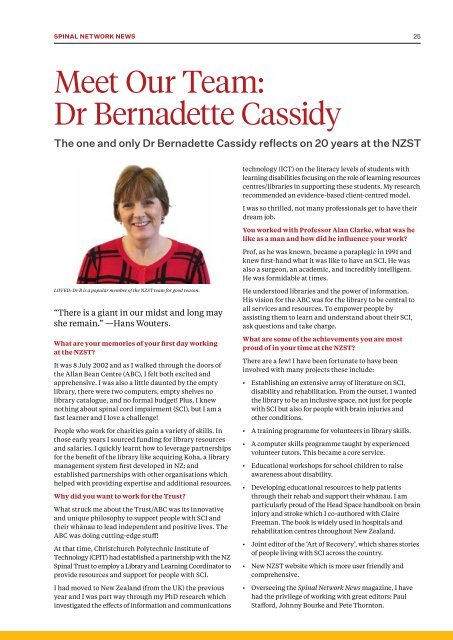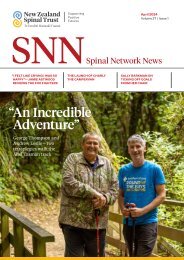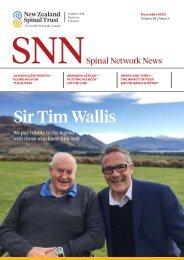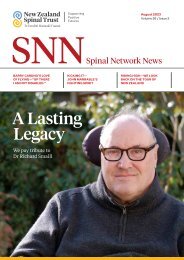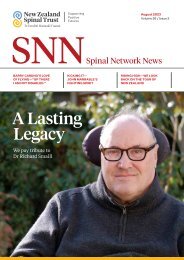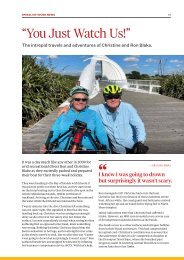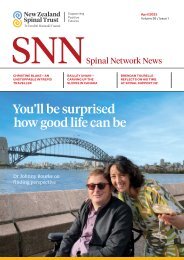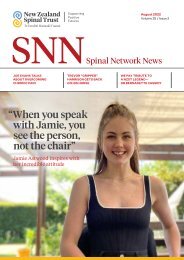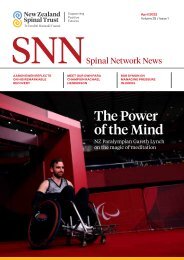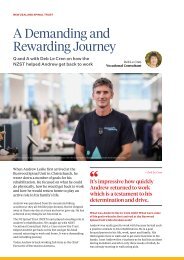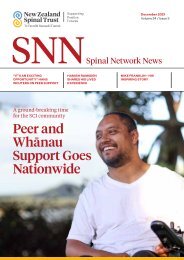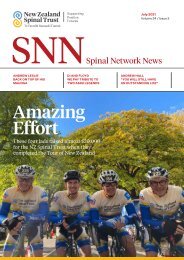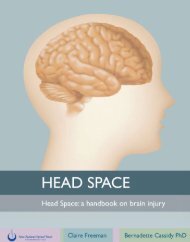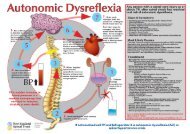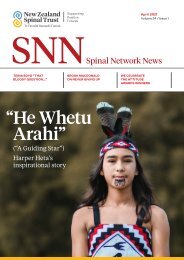SNN_December 2022 Issue_web low res
You also want an ePaper? Increase the reach of your titles
YUMPU automatically turns print PDFs into web optimized ePapers that Google loves.
SPINAL NETWORK NEWS 25<br />
Meet Our Team:<br />
Dr Bernadette Cassidy<br />
The one and only Dr Bernadette Cassidy reflects on 20 years at the NZST<br />
technology (ICT) on the literacy levels of students with<br />
learning disabilities focusing on the role of learning <strong>res</strong>ources<br />
cent<strong>res</strong>/libraries in supporting these students. My <strong>res</strong>earch<br />
recommended an evidence-based client-centred model.<br />
I was so thrilled, not many professionals get to have their<br />
dream job.<br />
You worked with Professor Alan Clarke, what was he<br />
like as a man and how did he influence your work?<br />
Prof, as he was known, became a paraplegic in 1991 and<br />
knew first-hand what it was like to have an SCI. He was<br />
also a surgeon, an academic, and incredibly intelligent.<br />
He was formidable at times.<br />
LOVED: Dr B is a popular member of the NZST team for good reason.<br />
“There is a giant in our midst and long may<br />
she remain.” —Hans Wouters.<br />
What are your memories of your first day working<br />
at the NZST?<br />
It was 8 July 2002 and as I walked through the doors of<br />
the Allan Bean Centre (ABC), I felt both excited and<br />
apprehensive. I was also a little daunted by the empty<br />
library, there were two computers, empty shelves no<br />
library catalogue, and no formal budget! Plus, I knew<br />
nothing about spinal cord impairment (SCI), but I am a<br />
fast learner and I love a challenge!<br />
People who work for charities gain a variety of skills. In<br />
those early years I sourced funding for library <strong>res</strong>ources<br />
and salaries. I quickly learnt how to leverage partnerships<br />
for the benefit of the library like acquiring Koha, a library<br />
management system first developed in NZ; and<br />
established partnerships with other organisations which<br />
helped with providing expertise and additional <strong>res</strong>ources.<br />
Why did you want to work for the Trust?<br />
What struck me about the Trust/ABC was its innovative<br />
and unique philosophy to support people with SCI and<br />
their whānau to lead independent and positive lives. The<br />
ABC was doing cutting-edge stuff!<br />
At that time, Christchurch Polytechnic Institute of<br />
Technology (CPIT) had established a partnership with the NZ<br />
Spinal Trust to employ a Library and Learning Coordinator to<br />
provide <strong>res</strong>ources and support for people with SCI.<br />
I had moved to New Zealand (from the UK) the previous<br />
year and I was part way through my PhD <strong>res</strong>earch which<br />
investigated the effects of information and communications<br />
He understood libraries and the power of information.<br />
His vision for the ABC was for the library to be central to<br />
all services and <strong>res</strong>ources. To empower people by<br />
assisting them to learn and understand about their SCI,<br />
ask questions and take charge.<br />
What are some of the achievements you are most<br />
proud of in your time at the NZST?<br />
There are a few! I have been fortunate to have been<br />
involved with many projects these include:<br />
• Establishing an extensive array of literature on SCI,<br />
disability and rehabilitation. From the outset, I wanted<br />
the library to be an inclusive space, not just for people<br />
with SCI but also for people with brain injuries and<br />
other conditions.<br />
• A training programme for volunteers in library skills.<br />
• A computer skills programme taught by experienced<br />
volunteer tutors. This became a core service.<br />
• Educational workshops for school children to raise<br />
awareness about disability.<br />
• Developing educational <strong>res</strong>ources to help patients<br />
through their rehab and support their whānau. I am<br />
particularly proud of the Head Space handbook on brain<br />
injury and stroke which I co-authored with Claire<br />
Freeman. The book is widely used in hospitals and<br />
rehabilitation cent<strong>res</strong> throughout New Zealand.<br />
• Joint editor of the ‘Art of Recovery’, which sha<strong>res</strong> stories<br />
of people living with SCI across the country.<br />
• New NZST <strong>web</strong>site which is more user friendly and<br />
comprehensive.<br />
• Overseeing the Spinal Network News magazine, I have<br />
had the privilege of working with great editors: Paul<br />
Stafford, Johnny Bourke and Pete Thornton.


